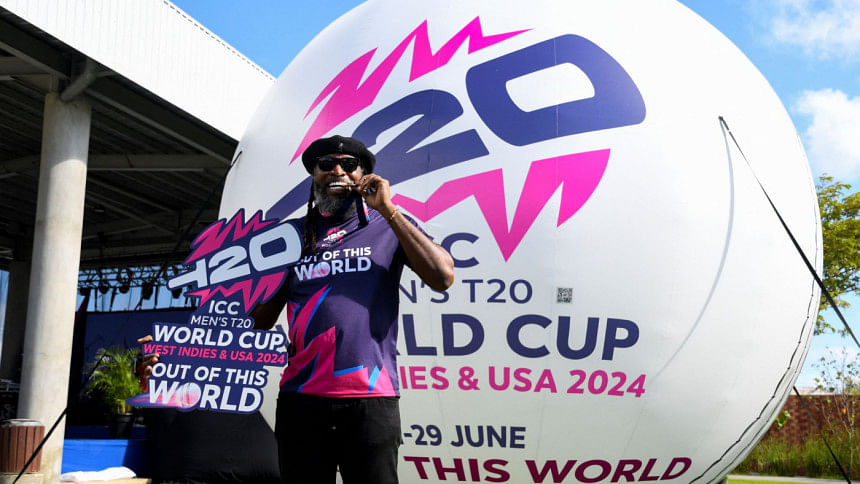Gayle hopes T20 World Cup can help cricket crack US market
Former West Indies star Chris Gayle hopes the T20 World Cup will help cricket crack the lucrative American sports market and lift the game onto a new global level.
The Twenty20 showpiece, which starts on June 1, is being jointly hosted by the United States and Gayle’s native West Indies, where big crowds are expected.
But it will be the first major international cricket tournament staged in the United States, with a sell-out crowd expected for the clash between arch-rivals India and Pakistan at a temporary 34,000-seat venue in Long Island, New York.
Gayle believes the success of last year’s inaugural Major League Cricket, a US-based T20 franchise competition, has given the game a foothold in America.
“The ICC (International Cricket Council) has been trying to get cricket on a global scale within the USA,” Gayle told AFP in an interview marking 100 days to go until the start of the ICC Men’s T20 World Cup 2024.
“India v Pakistan is in New York, I’m sure it’s going to be phenomenal.
“They (the USA) had a T20 tournament last year and it was a success. It’s a big market, we just have to hope it will be a success within the United States.”
West Indies have pedigree in limited-overs cricket, winning the first two men’s one-day international World Cups in 1975 and 1979, but they failed even to qualify for last year’s 50-over tournament in India.
“We missed out on the 50-over World Cup so this will be something fantastic for the guys to actually play for something,” said Gayle, speaking via video call from Barbados.
“We just want to be in the (June 29) final here in Barbados. Anything is possible when you make it to the final.”
“I’m excited for the people, to actually see a bit of cricket,” added big-hitting opener Gayle, who in 2007 became the first batsman to score a T20 international century.
The 44-year-old, a member of the West Indies teams that become T20 world champions in 2012 and 2016, said the current side had enough “options and experience” to relieve holders England of their title, even though they are a lowly seventh in the world rankings.
‘STRUGGLE’
The West Indies lost their recent ODI series in Australia 3-0 and went down 2-1 in the T20 series but they drew the Test series 1-1 as an under-strength team won a thiller in Brisbane by just eight runs against the reigning world champions in the five-day format.
It was the first time West Indies — who dominated Test cricket in the 1980s and 1990s — had won a Test in Australia since 1997 and Gayle said it was huge achievement for the side.
“The adrenaline, the excitement, to beat Australia (in a Test) after so many years, you know I’ve been a part of that struggle as well as a captain in Australia.
“To be able to get that win, in that fantastic manner as well, is something superb.
“To see the likes of (batting great) Brian Lara when he was actually doing the (television) commentary, how excited he was, we saw (former batsman) Carl Hooper shed tears as well.”
One pressing issue for global cricket chiefs is that top players no longer need to play internationals to make a living in an era of worldwide franchise competitions.
Former West Indies captain Jason Holder missed the Test series in Australia to play T20 cricket in the United Arab Emirates instead.
Gayle, one of the original globe-trotting T20 “guns for hire”, who had several run-ins with Caribbean cricket chiefs over availability, said it was down to administrators to rebalance the schedule.
“I’m in favour always of the players making their earnings, it’s their livelihood, it’s their job,” he said.
“Cricket is actually a big business, so we can’t beat down on a player to choose a franchise over his particular country, because there’s no loyalty from both sides.
“There’s just too much cricket and it takes away a bit from international cricket, unless there’s two big teams playing. They just need to structure it a bit better to make sure both teams are competitive when they are going against each other at international level.”
LondonGBDESK//



Comments are closed.